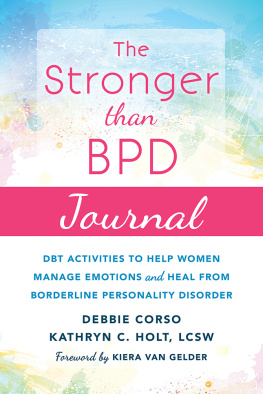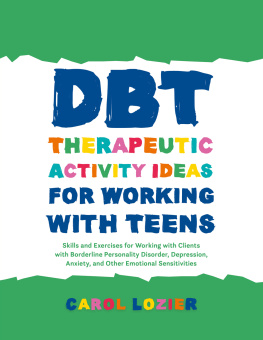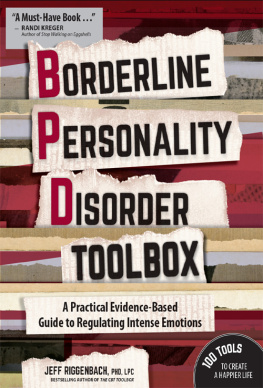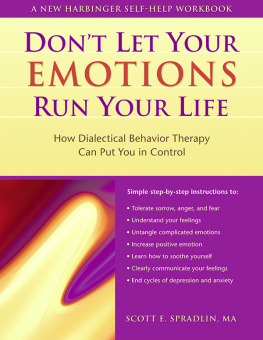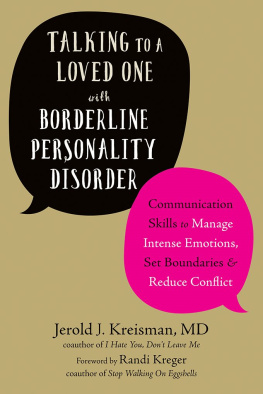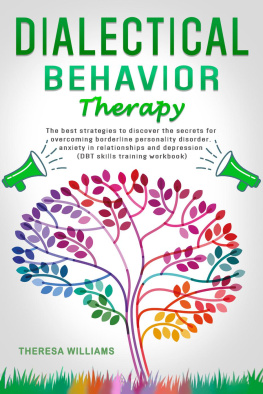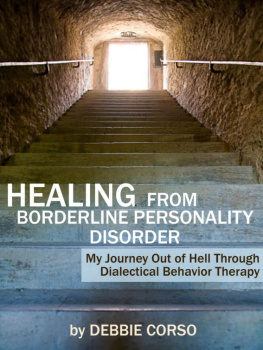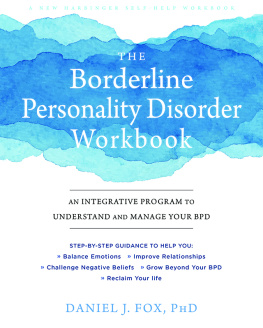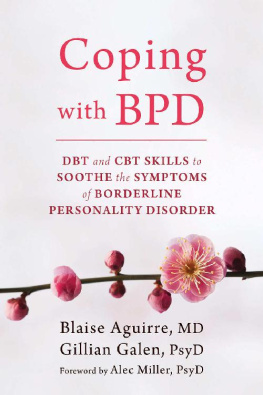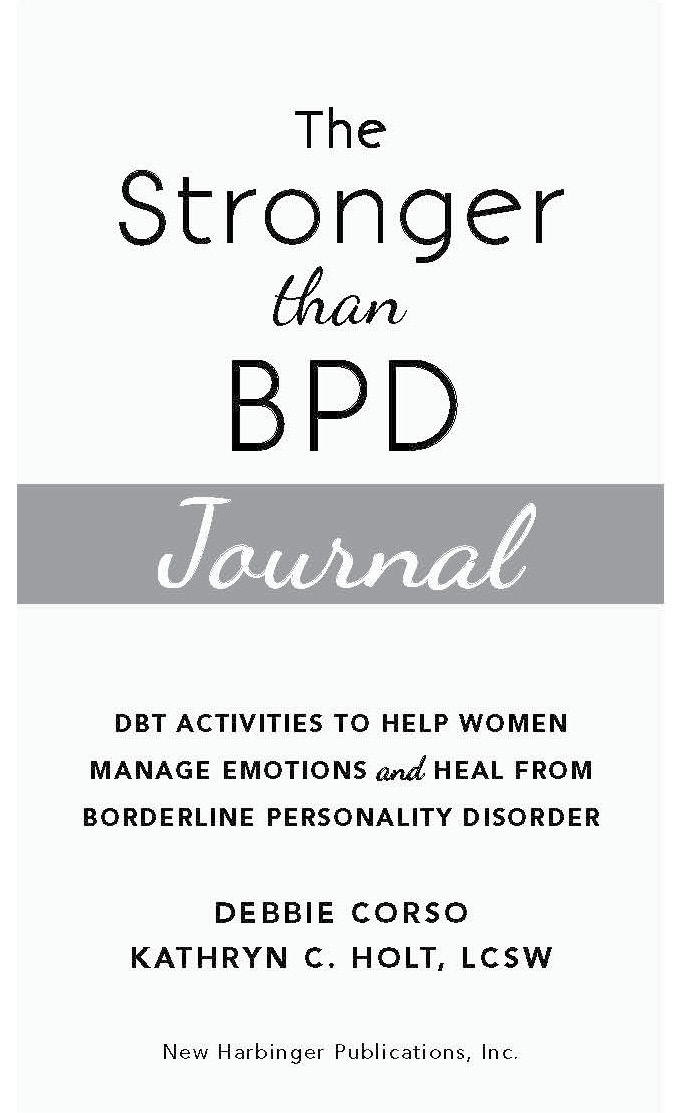As a dialectical behavior therapy (DBT) therapist, Im very excited to recommend The Stronger Than BPD Journal to my clients. This is a wonderful companion to Debbies first book, and will help take readers to a place in their lives where theyll build even more resiliency and support in their recovery.
Amanda L. Smith, LCSW , author of The Dialectical Behavior Therapy Wellness Planner
Two wise women help empower others to do a thorough inventory of all the patterns that will help you achieve equanimity.
Tamra Sattler, PhD, MFT , therapist, researcher, and entrepreneur
Publishers Note
This publication is designed to provide accurate and authoritative information in regard to the subject matter covered. It is sold with the understanding that the publisher is not engaged in rendering psychological, financial, legal, or other professional services. If expert assistance or counseling is needed, the services of a competent professional should be sought.
Distributed in Canada by Raincoast Books
Copyright 2018 by Debbie Corso and Kathryn C. Holt
New Harbinger Publications, Inc.
5674 Shattuck Avenue
Oakland, CA 94609
www.newharbinger.com
Cover design by Amy Shoup
Acquired by Jess OBrien
Edited by Marisa Solis
All Rights Reserved
Library of Congress Cataloging-in-Publication Data on file
Contents
Foreword
Dialectal behavior therapy (DBT) has long stressed the presence of Wise Mind , an inner blend of reason and emotion that gives us direct access to our innate, intuitive wisdom. When I initially learned about wise mind, my biggest question was But how do I really access it? Sure, its a great concept, and in rare moments, Id become aware of that small silent voice within. But I didnt want that voice to be small or mainly silent! I wanted and needed it to be strong, clear, and directly accessible. Wise mind needed to be a part of me, as real as my feelings and thoughts. So how does a person go from practicing the DBT skills and being dialectical to relying on this Yoda-like force of clarity, insight, and intuition?
Well, look no further. This groundbreaking book shows us the way. Debbie Corso and Kathryn Holt, veteran teachers and practitioners of dialectical behavior therapy, envision wise mind as a living part of us in the form of a Wise Woman. Our Wise Woman is intuitive, ever-present, and an intrinsic part of ourselves; like wise mind, she is the union of reason and emotion. But in this book we discover that she also is so much more. Wise Woman is a presence within us; we can speak to her, call on her, and receive direct guidance from herall of which The Stronger Than BPD Journal teaches us to do. The powerful and unique practices in this book guide us toward developing a relationship with that part of ourselves that serves our greatest good. And lucky for us, the techniques do not involve sitting in silence under tree all day! Instead we get to have fun, be creative, and nurture ourselvesand who wouldnt want more of that in life?
The Stronger Than BPD Journal is a brilliant road map not only because it helps us discover and connect with our Wise Woman. It recognizes that our capacity for healing and wholeness resides within ourselves. A central fact for many of us with trauma, BPD traits, and emotional sensitivity is that we are disconnected from ourselves. We have therefore also lost our connection to the Wise Woman inside us. With this book, Debbie and Kathryn help us further our journey toward reclaiming ourselves. With their help, we discover that self-trust, confidence, and self-love are all inside jobsthat is, when we know how to look and what to listen for. We understand that our deepest wisdom and enduring strength cannot be taken or given, but is our natural state, a guide that never left us and never will.
Kiera Van Gelder, MFA Author of The Buddha and the Borderline
Introduction
Do you ever feel like life is just too much to manage because you experience your emotions so deeply and intensely? Do you ever wish that you had a way to tune in to your own intuition without becoming overwhelmed? Maybe you feel as though simply navigating the worldfrom handling everyday tasks to managing more challenging situationsis too much to bear. You might hunger to know your place in the world as an emotionally sensitive person. No matter the cause, when your emotions come they are so intense that they affect your ability to think clearly and make wise decisionsand you end up experiencing lots of suffering.
Your suffering might appear as struggling to achieve what you deeply desire in life, such as feeling balanced and stable, handling emotional triggers without a crisis, keeping a job, or forming and maintaining meaningful relationships. These desires can feel painfully out of reach when you dont know how to manage your emotions. You may even have grown hopeless about being able to get out of this rut and build the life you really want.
But something is shifting. Youre feeling motivated and want to examine the self-defeating thoughts and behaviors that have been holding you back. Youre becoming curious about the strong impact of your thoughts on your mood. Youre ready to change coursefrom living in a state of emotional reaction to skillfully responding to lifes inevitable upsets. While it is not a replacement for therapy, the Stronger Than BPD Journal provides practices that will help you see and experience your emotional sensitivity as a strength. This journal can be a great beginning for self-exploration and healing. You are certainly not alone, and there is hope. This book is written for you .
Emotional Sensitivity
Maybe you have borderline personality disorder (BPD), BPD traits, or are emotionally sensitive and experience your emotions much more intensely than other people.
Borderline personality disorder is a diagnosis that is characterized by intense emotions, chaotic relationships, and difficulty tolerating distress, and these challenges persist throughout a persons life (American Psychiatric Association 2013). According to the biosocial theory of BPD, this emotional sensitivity is a result of biological disposition, living in invalidating environments, and the interaction of these factors (Linehan 1993).
Some people identify with certain traits of this diagnosis without fully meeting the criteria for BPD. This is referred to as having BPD traits . Throughout this journal, we use the term emotionally sensitive interchangeably with BPD and BPD traits.
Whether you identify as having borderline personality disorder, BPD traits, or emotional sensitivity, you may be familiar with experiencing intense, frequent, and prolonged emotions. And, as a result, you may notice challenges in the following areas of your life:
- Relationships often feel intense, unstable, and fleeting. There is often a strong fear of abandonment and rejection that fuels this.
- Emotions often seem overwhelming and as if theyll last forever. This is because people with BPD traits experience emotions for a greater period of time, causing their nervous systems to stay activated longer than a person without BPD traits. This makes it harder to return to a sense of emotional equilibrium (Aguirre and Galen 2013).
- Behavioral responses are frequently self-harming or self-sabotaging. Because emotions can feel so intense and, at times, unbearable, people with BPD sometimes gravitate toward impulsive behaviors that provide temporary relief despite long-term consequences.

